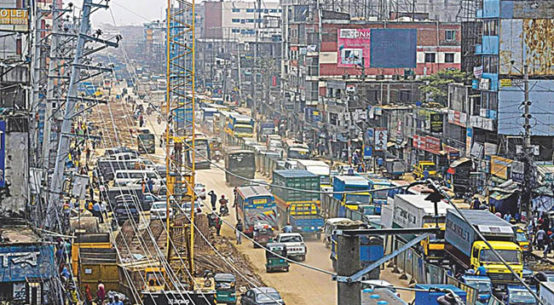Amid the Covid pandemic, the number of road accidents has decreased in neighbouring India, Pakistan and Myanmar. Accidents in these three countries have decreased by 20, 13 and 19 per cent respectively. But Bangladesh has seen a completely different picture. According to the data, the number of accidents in the country had been 50 more in 2020 as compared to that in 2019. More alarming is the fact that the rate of accidents grew by 107 per cent in the last seven years, from 2014 to 2020. Meanwhile, road accidents have become a serious national problem. Its frequency is increasing day by day, causing many lives to be lost on roads. It is high time to pull the string.
In order to prevent the spread of the novel coronavirus, traffic was restricted for quite a long time last year. Hence, it was expected that road accidents would reduce. But that did not actually happen. There is more than one reason behind this increasing trend. Although public transports were closed during the lockdown, small vehicles were plying roads and highways. Many travelled long distances, even by motorcycles. Even incompetent drivers came out on empty roads with their motorcycles and ran them recklessly. Psychological stress also worked among them for a lot of the time due to restrictions on movements. In addition, small vehicles are usually light-weight and relatively risky. After all, there was less traffic surveillance at that time. Although a new road law was enacted, it could not be implemented. As a result of all these reasons, the number of road accidents has increased.
At the same time, the implementation of the new motor vehicle law, an increase in fines and penalties in the law, the modernisation of the vehicle surveillance process reduced road accidents in India. The decline in road crashes in Pakistan has been due to proper enforcement of lockdowns and tightening of the traffic system. Accidents have also dropped in Myanmar due to Covid-induced restrictions on public movements. Taking into account the realities of neighbouring countries, our road safety, traffic management is very much questionable, and it is frustrating.
A great way to ensure road safety is to modernise the traffic system. In the field of traffic management, modern and advanced technology is being used in developed countries nowadays. Western developed countries like the United States of America, the United Kingdom, Germany, France as well as developed countries of East Asia like Singapore, Japan and South Korea have also developed automated traffic systems based on technology. Even India is not lagging behind in this respect. They are developing various innovative systems utilising technology. For example, the country has introduced a smartphone-based speed-breaker early warning system (SWAS) to reduce accidents. Many such innovations are taking place in various fields of traffic management in India, but Bangladesh’s traffic is still being managed in a traditional manner, which is not at all consistent with the economic aspirations. Considering the global experiences, rapid progress is needed in this regard.
It is important to prevent accidents not only from a humanitarian but also an economic point of view. Research has shown that working people are the biggest victims of road accidents in Bangladesh. The death of an able-bodied person is also a cause of income loss for some families and bears a negative impact on the national income. According to an estimate, meeting the target of reduction in accidents by 50 per cent could boost the national economy by 7 to 22 per cent. Therefore, the government needs to take immediate steps to improve road safety, and there is no alternative to it.

